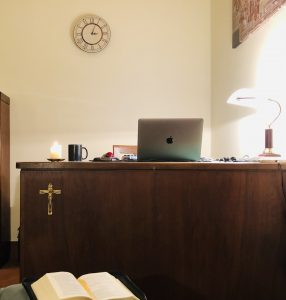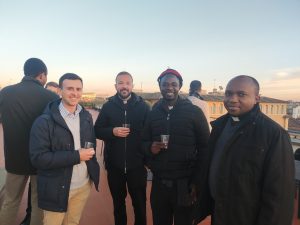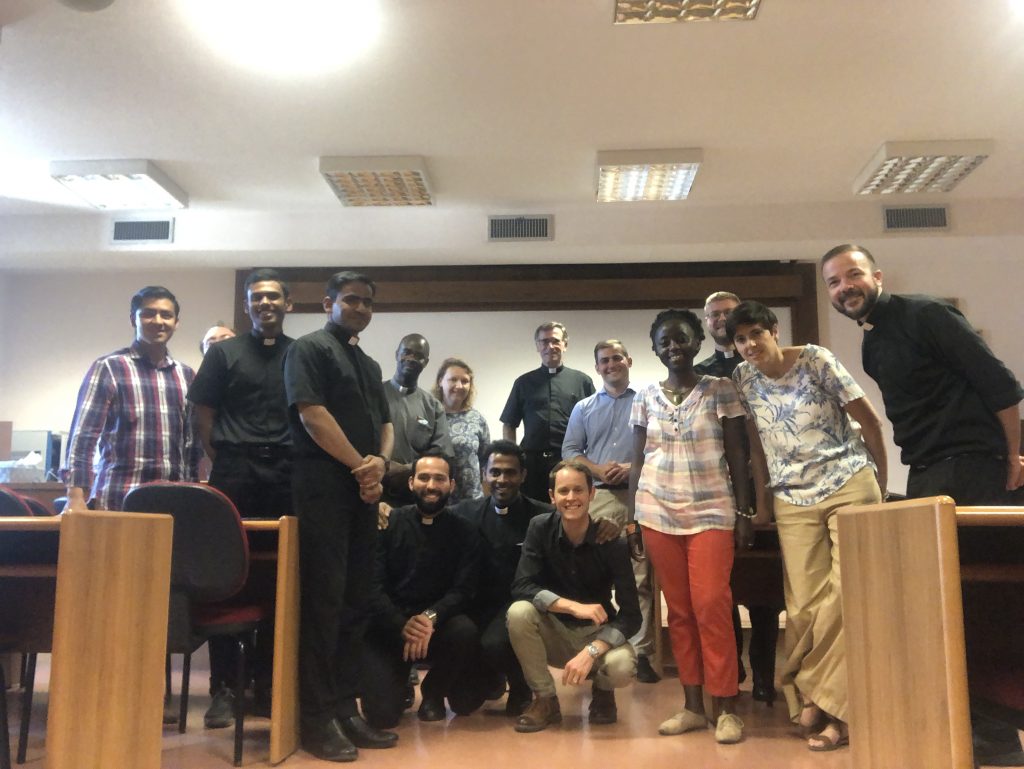It was around this time last year that I was rounding up the last bits of paperwork and saying goodbye to everyone at St. Mary Magdalen Church in Camarillo, my parish assignment since being ordained a priest in 2019. Archbishop José H. Gomez had called me to go for further studies in dogmatic theology at the Pontifical University of the Holy Cross in Rome. My mission was simple: Be a sponge. Take in as much of the truth, goodness, and beauty of the Eternal City as possible, and then come home to share it with others.
Now, as I look back on this first year, two feelings come to mind. On the one hand, there’s immense gratitude for the many gifts I have been given, like the ability to pray and study in this beautiful city with its churches, art museums, parks, and culture; on the other hand, a certain sense of heartache, with all the suffering, unforgiveness, and divisiveness in the world today.

And yet, there’s one thing — the most important thing — that I learned from school this year that has helped me make sense of both the gratitude and the heartache.
Creation is good.
Sometimes when we hear the word “creation,” we think about going outside into nature and looking at all the beautiful trees and mountains. This makes sense, but the word creation has a much deeper meaning in the context of theology.
To put it simply: All that exists outside of God is the one creation. The Catholic Church has many profound things to say about this, like how God creates “ex nihilo” (“out of nothing”), revealing that he is all-powerful and capable of recreating our inner being. There’s also the truth of God’s providence, how he is always present to us.
But the goodness of creation: This might seem like a small and obvious point, but it’s a huge deal, and we often forget it.
Some think that, as the result of a primordial battle between lightness and darkness, good and evil were equally fashioned into the fabric of creation (the most common is the yin and yang idea). Others, misunderstanding the relationship between creation and evolution, claim moral evil is really something good because it leads to progress. Still others think creation is downright oppressive, like a cage, and therefore something to be escaped or changed according to one’s own selfish desires.
Nothing could be further from the truth. God is good (yes, all the time) and creation participates in God’s goodness. We read in Genesis, “God looked at everything he had made, and found it very good” (1:31). Pope St. John Paul II helps us go deeper. He says, “The creation of the world is a work of love.” Wow! Thank you, God!
Understanding and believing this helps explain that feeling of gratitude. But what about the heartache? Since the Father’s original plan for creation included love, and since love requires freedom, we humans were created with freedom. But we misused our freedom and ditched the plan. Well, first the angels, and then us, but the point is that evil did not come from God; it came from us.

The Church’s teaching on the goodness of creation helps us see more clearly the origin of evil and leads us to draw important conclusions relevant for our daily lives.
First, instead of blaming everyone and everything else for the evil in this world, we might do better to first look at ourselves. Just because sin entered through our disobedience doesn’t mean it has to keep going on that way. We can decide right now that the sinful patterns will end with us.
Second, since evil wasn’t a part of God’s original plan for creation, we never celebrate it. Sometimes we might be tempted to honor our past traumas or suffering, especially since it might afford us moral authority or a place of prominence in the public square. While we do well to courageously bring our wounds into the healing light of Christ, we don’t worship them. We are beloved daughters and sons of the Father and celebrate only the good that comes from his healing hand.
Third, instead of looking at all the evil in society and saying, “It’s hopeless! Let’s just tear it all down and start over,” we might remember that God didn’t give up on us, and neither should we give up on one another. Our hope is in Jesus, and if we turn to him with sincere hearts, we can be forgiven and forgive those who hurt us.
In Christ, and through his heartache, we can be grateful, no matter what’s going on in the world around us. And nothing expresses this better than the Eucharist.
Instead of spending our time looking at screens where media experts monetize our attention, stir up our anger, and promote division, we can spend time with Our Lord in the Eucharist where Jesus gives us attention, stirs up our love and offers reconciliation.
The Catechism of the Catholic Church teaches, “Creation was fashioned with a view to the Sabbath and therefore for the worship and adoration of God” (347). May our Blessed Mother help us rest with her Son Jesus, who consumes the evils of this world and unites us with all of creation in the one hymn of praise and thanksgiving to the Father.

